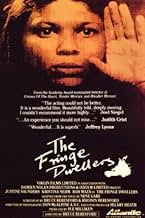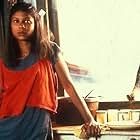Story of an aboriginal family who tries to move out of the fringe into the main white community.Story of an aboriginal family who tries to move out of the fringe into the main white community.Story of an aboriginal family who tries to move out of the fringe into the main white community.
- Awards
- 1 win & 7 nominations
Oodgeroo Noonuccal
- Eva
- (as Kath Walker)
- Director
- Writers
- All cast & crew
- Production, box office & more at IMDbPro
Storyline
Did you know
- TriviaJoe Comeaway says that he fought with Jimmy Sharman's troupe. 'Jimmy Sharman' was the name borne by a father and son pair of showmen. Both Sharmans toured agricultural shows around Australia with a troupe of boxers, with the father commencing operations in 1911 and the son taking over in 1955 and continuing the operation until new boxing regulations forced the closure in 1971. Many different boxers fought in his troupe, including many Aboriginals. Given the time period of the movie, Joe must have fought in Jimmy Sharman Jr.'s troupe.
- SoundtracksBrown Skin Baby
used by permission of Bob Randall
End titles arrangement by Robert Gavin
Performed by Michele Miles
Featured review
Accustomed to seeing portrayals of racism against African-Americans or Native Americans, I was intrigued to see some of the same phenomena in an Australian context.
The central character, Trilby Comeaway, part of extended family of Aborigines living in a shanty settlement outside a rural town, is one angry young lady. Her anger is directed not only at the local whites, who are abusively racist at worst and patronizing at best, but against her own family, many of whom seem to have internalized the stereotypes and are living in an irresponsible manner, even after being given a house in a public housing tract.
Looked at one way, the film could be seen as a condemnation of Aboriginal culture, but what it is actually portraying is the vacuum created when people lose or are deprived of their ancestral culture but are unable, for whatever reason, to participate fully in the dominant culture.
The members of the Comeaway family have some admirable qualities, such as their generosity to their extended family, one of the few Aboriginal cultural traits that they have retained. However, having internalized the stereotype of the irresponsible, child-like Aborigine, they have trouble functioning effectively in white society.
The story takes a different turn when a young man engaged in the Aboriginal land rights movement shows up and, among other things, becomes Trilby's lover.
Trilby is not always a likable person. She has a huge chip on her shoulder, and she does one thing that is quite shocking. However, the film seems to be saying that it's the "uppity" people in a minority group who will escape the trap of sinking into the stereotypes.
The central character, Trilby Comeaway, part of extended family of Aborigines living in a shanty settlement outside a rural town, is one angry young lady. Her anger is directed not only at the local whites, who are abusively racist at worst and patronizing at best, but against her own family, many of whom seem to have internalized the stereotypes and are living in an irresponsible manner, even after being given a house in a public housing tract.
Looked at one way, the film could be seen as a condemnation of Aboriginal culture, but what it is actually portraying is the vacuum created when people lose or are deprived of their ancestral culture but are unable, for whatever reason, to participate fully in the dominant culture.
The members of the Comeaway family have some admirable qualities, such as their generosity to their extended family, one of the few Aboriginal cultural traits that they have retained. However, having internalized the stereotype of the irresponsible, child-like Aborigine, they have trouble functioning effectively in white society.
The story takes a different turn when a young man engaged in the Aboriginal land rights movement shows up and, among other things, becomes Trilby's lover.
Trilby is not always a likable person. She has a huge chip on her shoulder, and she does one thing that is quite shocking. However, the film seems to be saying that it's the "uppity" people in a minority group who will escape the trap of sinking into the stereotypes.
Details
Box office
- Gross US & Canada
- $149,440
- Opening weekend US & Canada
- $15,940
- Jan 25, 1987
Contribute to this page
Suggest an edit or add missing content













